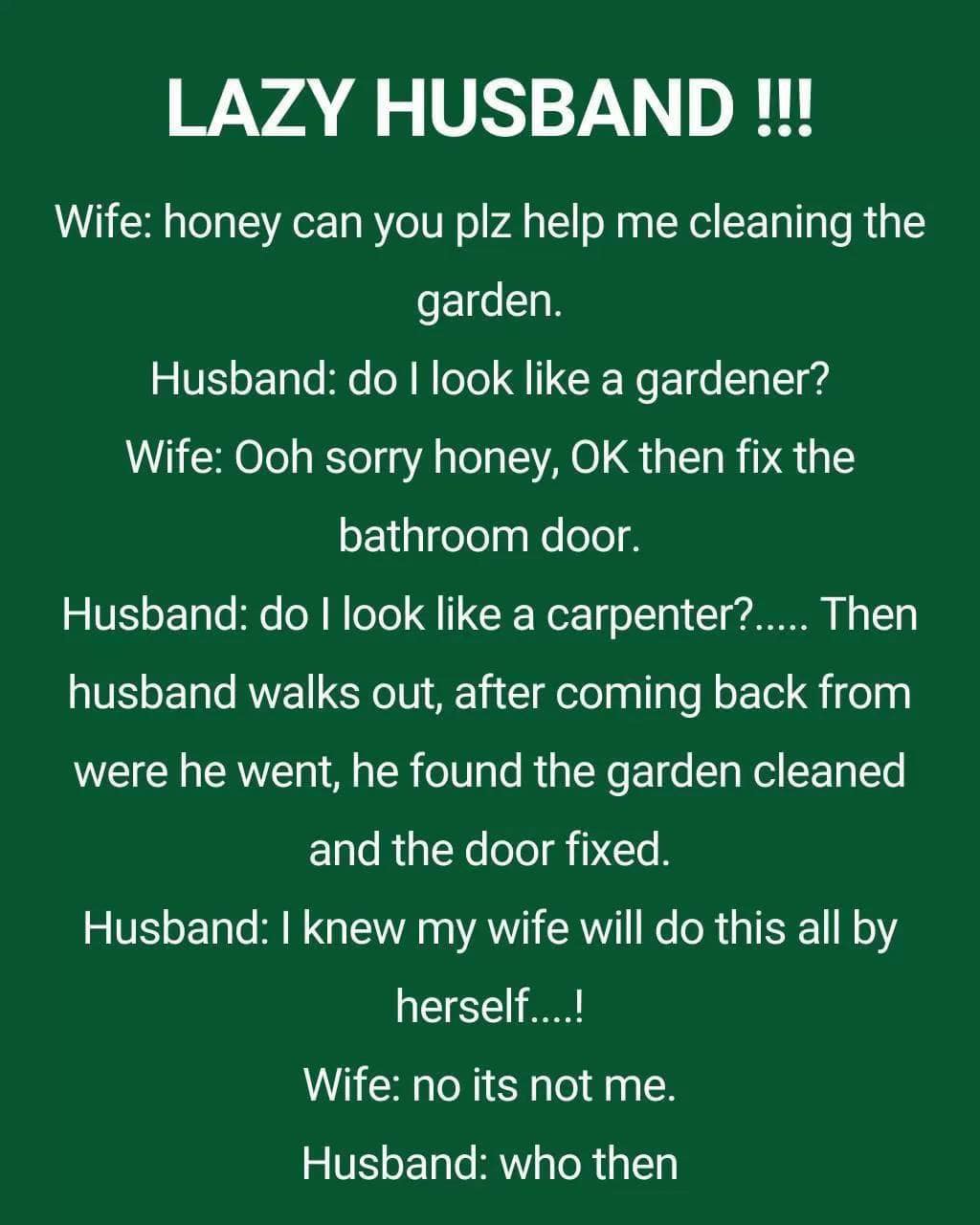One sunny afternoon, a wife approached her husband as he lounged on the couch, scrolling through his phone. With a warm smile, she asked, “Honey, would you mind clearing the garden for me? It’s starting to look overgrown, and I’d really appreciate the help.”
Her husband glanced up, smirking slightly. “Do I look like a landscaper to you?” he replied, clearly uninterested in the task. His response caught her off guard, but she didn’t argue. Instead, she sighed and returned to her own list of chores.
Later in the day, she made another attempt. “Alright,” she said, “if the garden isn’t a priority, maybe we can work on fixing the bathroom door? It’s been sticking for weeks, and it’s really becoming a hassle.”

Once again, her husband dismissed the idea. “Do I look like a carpenter?” he retorted, laughing at his own wit. His wife shook her head and walked away, realizing she wouldn’t get much help from him.
Days turned into weeks, and the tasks remained untouched. The garden grew more unruly, and the bathroom door became even more difficult to close. The wife, however, had grown tired of waiting for her husband to step up, so she decided to take matters into her own hands—or so her husband thought.
One afternoon, the husband came home from running errands and noticed something unusual. The garden looked immaculate—the grass was neatly trimmed, and the flowerbeds were perfectly weeded. Confused, he headed inside, only to discover that the bathroom door was fixed as well. It swung open and shut effortlessly, as though it had never been an issue.
Intrigued, he sought out his wife, who was relaxing in the living room. “Wow,” he began, “I see you got everything taken care of. I knew you’d handle it on your own eventually!” He chuckled, proud of his assumption that his wife had resolved the issues herself.
But she shook her head with a slight grin. “Oh, it wasn’t me,” she replied.
The husband frowned, puzzled. “It wasn’t? Then who did all this work?”
“The woman next door,” his wife said casually.
His confusion deepened. “Wait… the woman next door? How did you manage to get her to do all this?”
“She offered to help,” the wife said, shrugging. “She didn’t want any money, though.”
At this, the husband raised an eyebrow. “She didn’t want money? What did she want, then?”
“She gave me two options,” his wife explained with a sly smile. “She said I could repay her with either a loaf of bread or… something a bit more intimate.”
The husband’s face turned beet red. “Please tell me you gave her some bread!” he exclaimed, clearly alarmed by the alternative.
With a twinkle in her eye, the wife leaned forward and asked, “Do I look like a bakery to you?”
Her response left the husband speechless. The humor in her comeback hit him hard, but it also carried a deeper lesson. In his reluctance to help out around the house, he had inadvertently created a situation where his wife sought assistance elsewhere. While the story was delivered with humor, it served as a wake-up call for him to reevaluate his role in their partnership.
This lighthearted tale reminds us of the importance of teamwork and shared responsibility in a marriage. A successful relationship is built on mutual support and understanding. When one partner consistently shirks their duties, it can lead to frustration, resentment, and even a loss of respect. However, a little effort can go a long way in maintaining harmony and appreciation in a household.
For many couples, balancing household chores and responsibilities can be a challenge, especially when both partners have busy schedules. Communication is key to ensuring that neither person feels overburdened. In this story, the husband’s dismissive attitude highlighted the pitfalls of ignoring shared responsibilities. By choosing humor over anger, the wife cleverly illustrated her point without resorting to conflict.
While this anecdote is amusing, it also sheds light on an all-too-common issue. According to studies, women still bear the majority of household labor, even in dual-income households. This disparity often leads to feelings of burnout and inequality. For relationships to thrive, it’s crucial for both partners to actively participate in maintaining their home and supporting each other.
So, what can couples take away from this story? First, it’s essential to acknowledge and value each other’s contributions, whether big or small. Helping out with tasks, even if they seem mundane, demonstrates care and respect for your partner. Second, humor can be a powerful tool in addressing conflicts. By keeping things lighthearted, couples can navigate tricky situations without escalating tensions.
Finally, this story underscores the importance of not taking your partner’s efforts for granted. A little appreciation can go a long way in fostering a strong, loving relationship. And for those who might be tempted to say, “Do I look like a landscaper?” or “Do I look like a carpenter?”—remember that teamwork makes the dream work. After all, no one wants to hear, “Do I look like a bakery to you?”
In the end, the husband learned a valuable lesson about partnership and the consequences of complacency. It’s safe to say he won’t be refusing to help out around the house anytime soon. And for the rest of us, this story serves as a humorous yet poignant reminder to pitch in and support the people we care about.





